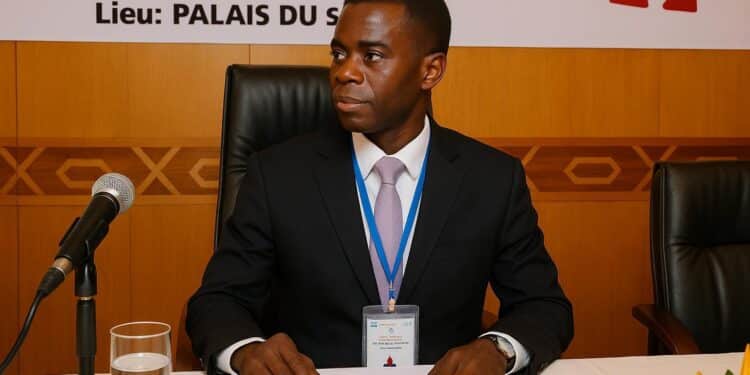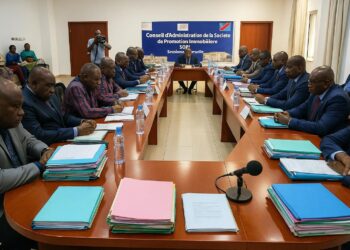A Succession Case Gains National Attention
When human-rights advocate Franck Chardin Aubin Tchibinda petitioned the Brazzaville prosecutor on 25 July 2025, an inheritance dispute that had simmered for years entered the national conversation. At its core lies the management of the late businesswoman Adèle Barayo’s diversified portfolio, a symbol of domestic entrepreneurial success.
From Family Discord to Courtroom Strategy
Relatives of the deceased initially turned to conciliation, but contested share valuations and property titles soon required judicial oversight. An emergency ruling of 1 December 2020 appointed bailiff Jérôme Gérard Okemba Ngabondo as sequestrator, entrusting him with temporarily safeguarding assets ranging from real estate to minority stakes in transport ventures.
Role and Responsibilities of a Sequestrator
Under Congolese civil procedure, a sequestrator functions as an impartial custodian, preserving property during litigation and reporting transparently to the court. The office is rooted in OHADA uniform acts, echoing regional ambitions for predictable commercial justice that reassures creditors, heirs and foreign partners alike.
Emergence of Allegations
Four years into his mandate, Mr Okemba Ngabondo now faces accusations of fraud, breach of trust and abuse of office. Tchibinda alleges unexplained withdrawals from estate accounts and the unnotified sale of two Brazzaville apartments, claims reportedly corroborated by preliminary gendarmerie accounting (Les Dépêches de Brazzaville, 30 July 2025).
Parallel Investigations Underway
The first file, opened after a Pajed press briefing, reached the public prosecutor on 14 July. A second probe, ordered by the Supreme Court and channelled through the Court of Appeal, remains with the research section of the Departmental Gendarmerie. Investigators are said to be reconciling banking slips with notarised ledgers.
Legal Grounds for a Provisional Suspension
Tchibinda’s petition cites a 15 June 2022 French Court of Cassation precedent allowing temporary suspension of any officer under criminal investigation. Though not binding, Congolese jurists often invoke such persuasive authority when domestic statutes offer interpretative grey zones, especially regarding auxiliary officers such as bailiffs.
Doctrine Versus Discretion
Professor Léonie Mavoungou of Marien Ngouabi University notes that Congolese courts historically balance the presumption of innocence against the need to protect litigants. “Suspension is neither punishment nor acquittal,” she explains, “but a prudential measure preserving confidence in the process while facts are clarified.”
Government Emphasis on Judicial Credibility
Officials underline that the affair demonstrates the vitality of institutional checks. A Justice Ministry spokesperson argues that active probes confirm “zero-tolerance for professional misconduct” and align with President Denis Sassou Nguesso’s 2021–2026 governance programme prioritising transparency within the judiciary.
Stakeholder Reactions
Barayo family counsel, Maître Sylvestre Malonga, welcomes the petition yet cautions against premature conclusions. Conversely, the National Chamber of Bailiffs expresses concern over reputational fallout but pledges full cooperation, stating that “the integrity of one officer must not eclipse decades of service by the profession.”
Implications for Business Climate
Foreign executives watching Congo’s energy and construction tenders view court-appointed custodians as guardians of collateral. According to an African Development Bank note from April, predictable asset protection can shave two percentage points off financing costs. A transparent resolution therefore resonates beyond a single inheritance.
Diplomatic Echoes
Several embassies, including those of France and Brazil, are discreetly monitoring proceedings, diplomats tell this magazine. Their interest stems less from potential consular involvement than from broader conversations on the enforceability of local judgments in cross-border debt recovery.
Regional Context
Comparable cases in Cameroon and Côte d’Ivoire have led to temporary suspensions without political controversy, reinforcing a continental trend toward proactive oversight. The Central African Economic and Monetary Community recently endorsed guidelines encouraging member states to discipline auxiliary judicial officers swiftly yet fairly.
Balancing Rights and Reforms
Rights advocates argue that removing a sequestrator mid-case can disrupt estate administration, yet most concede that alleged fiduciary breaches necessitate swift action. The debate thus hinges on calibrating speed with due process, an equilibrium that increasingly defines modern African judiciaries.
Chronology of the Next Steps
The Court of Appeal is expected to rule on the suspension motion within weeks. Should it uphold the request, a new sequestrator could be chosen from a vetted shortlist while criminal proceedings advance through instruction, potential indictment and, if warranted, trial at the Tribunal de grande instance.
Possible Outcomes for the Estate
If allegations prove unfounded, Mr Okemba Ngabondo would resume duties, and damages could be sought for reputational harm. Confirmation of wrongdoing, however, could trigger civil indemnities to heirs, professional disbarment and, under Article 60 of the Penal Code, imprisonment up to five years.
Signals to International Partners
A case handled with procedural rigor could bolster Congo-Brazzaville’s narrative of legal modernisation, reinforcing messages delivered during the U.S.–Africa Leaders Summit and at recent IMF consultations. Conversely, delays might reignite perennial investor concerns about contract enforcement.
Expert Forecasts
Legal analyst Armand Koumba anticipates a provisional suspension, noting that “courts tend to err on the side of protection when family wealth and public confidence intersect.” Yet he stresses that any ruling will likely underscore the presumption of innocence to avoid prejudicing subsequent criminal adjudication.
A Test of Institutions, Not Individuals
Beyond personal allegations, the Barayo succession embodies Congo-Brazzaville’s ongoing endeavor to align domestic practice with regional and international standards. The judiciary’s response will shape perceptions of accountability, safeguard heirs’ rights and signal to global partners that ongoing reforms are more than aspirational.












































